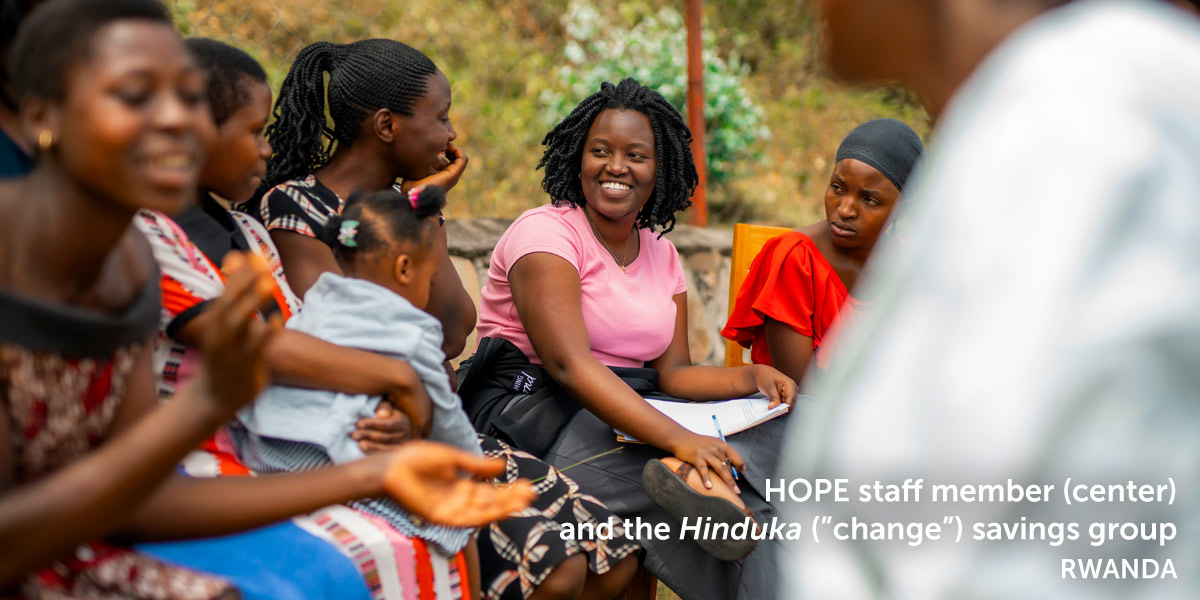By Charlotte Sprecher (pictured left), 2023 HOPE LM&E fellow
Can listening to a person’s situation help alleviate poverty?
As a fellow on the listening, monitoring, and evaluation (LM&E) team at HOPE International, I have come to believe that it is where we must start.
At HOPE, the LM&E team conducts surveys to learn how to improve our programs, close the feedback loop, and honor the stories we hear. Although we listen to evaluate our ministry, we also believe that listening is part of the ministry itself! Asking someone for feedback plays an important part in how we build a relationship with them and affirm their God-given value.
Best practices for listening well
How do we practically live out listening as ministry?
1. See those you’re listening to as equal participants in the ministry. Listening is baked into HOPE’s foundation story. Because our founder Jeff Rutt honored the partnership of the church he wanted to help in Ukraine, he listened to Pastor Patrenko, who shared how ongoing free gifts were actually undermining their community’s ability to provide for themselves. This honest conversation led to HOPE’s work today!
2. Recognize that presence is valuable and affirms dignity. I first learned this when my college class visited South Africa to conduct marketing workshops with entrepreneurs. At first, I was skeptical that we would make an impact. But as we cried together with joy over their final presentations, having done more listening than advising, I realized the greatest gift we offered that week was our presence. Our most powerful involvement in their lives was not giving them money or advice, but sitting down, looking them in the eyes, and saying, “I see you, and what you have to say is valuable to me.”
3. Listen to the glory of God. “We want to put into focus how God is moving among us and engage with great honor for the stories of those that we’re being entrusted with.” Rebecca Redfield, LM&E team manager
Each interview is an opportunity to celebrate what God is doing!
4. Be prepared to act on what you hear. We all like to gather information out of curiosity. In LM&E surveys and in everyday life, we don’t want to just ask interesting questions, satisfy our itch to know more, and walk away. When a conversation reveals a need, we want to ensure that we listen with care and do what is within our power to respond!
Becoming better listeners
I am so taken with this idea of listening well because of how I personally have been listened to during my fellowship at HOPE. My team has consistently asked for my insight, thanked me for my time, praised God with me for good things happening in my life, and taken action right away when I’ve needed clarity. Because of this, our work has improved, and I have been ministered to!
By approaching each other humbly, we recognize that everyone we listen to—global staff, the entrepreneurs we serve, supporters, savings group members—has the same God-given dignity and the same material, spiritual, social, and personal needs. This helps us approach everyone with the intention to learn from their God-given wisdom, be present, honor their stories, and act on what we hear. It all starts by pulling up a chair to listen.
 Charlotte Sprecher is an LM&E fellow at HOPE International. Having recently graduated from the University of Cincinnati Linder College of Business, she is thrilled to be living out her dreams of working for a deeply thoughtful international Christian organization and living down the road from an Amish farm stand.
Charlotte Sprecher is an LM&E fellow at HOPE International. Having recently graduated from the University of Cincinnati Linder College of Business, she is thrilled to be living out her dreams of working for a deeply thoughtful international Christian organization and living down the road from an Amish farm stand.
















